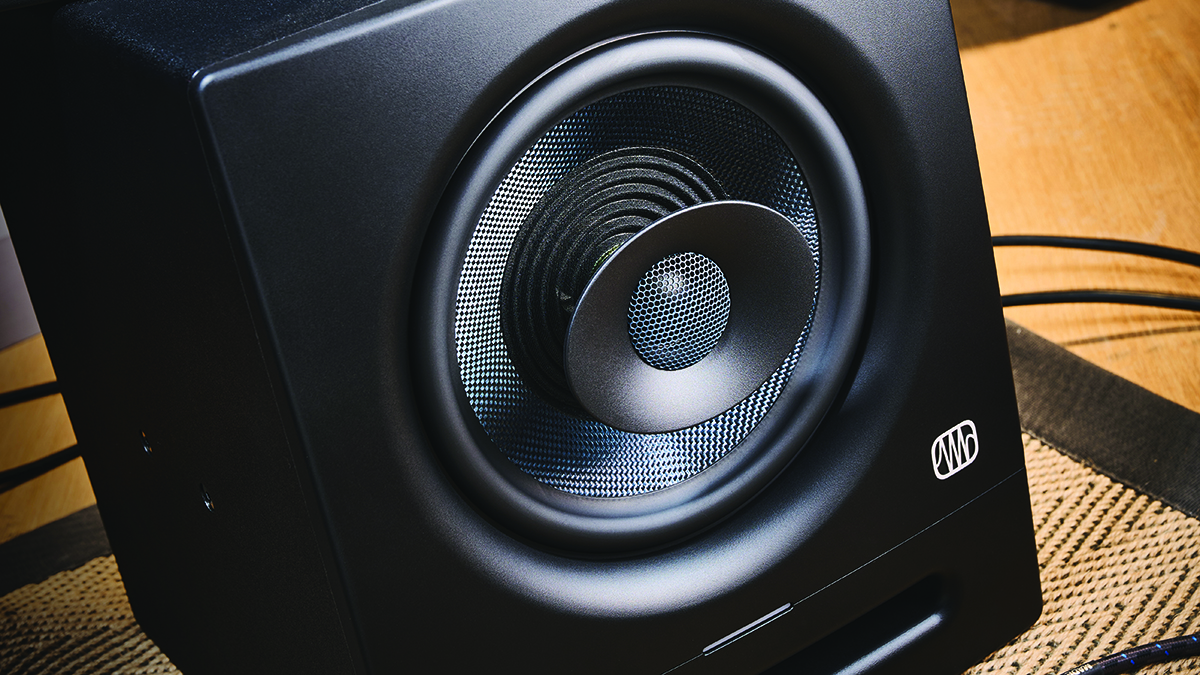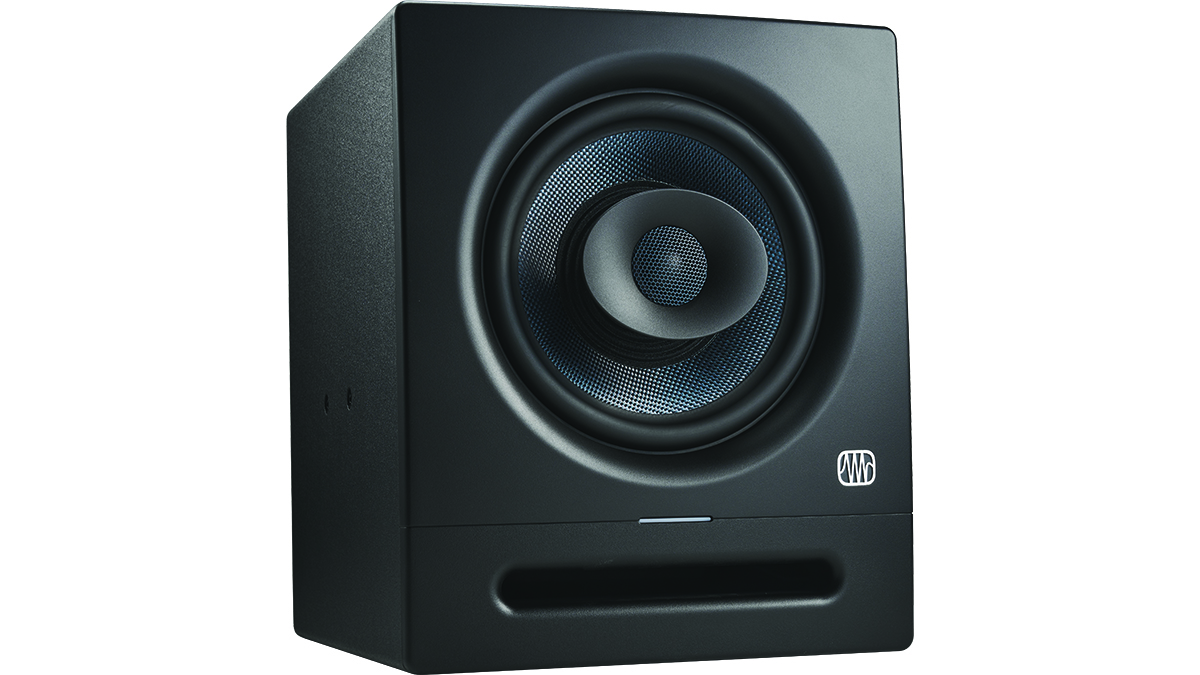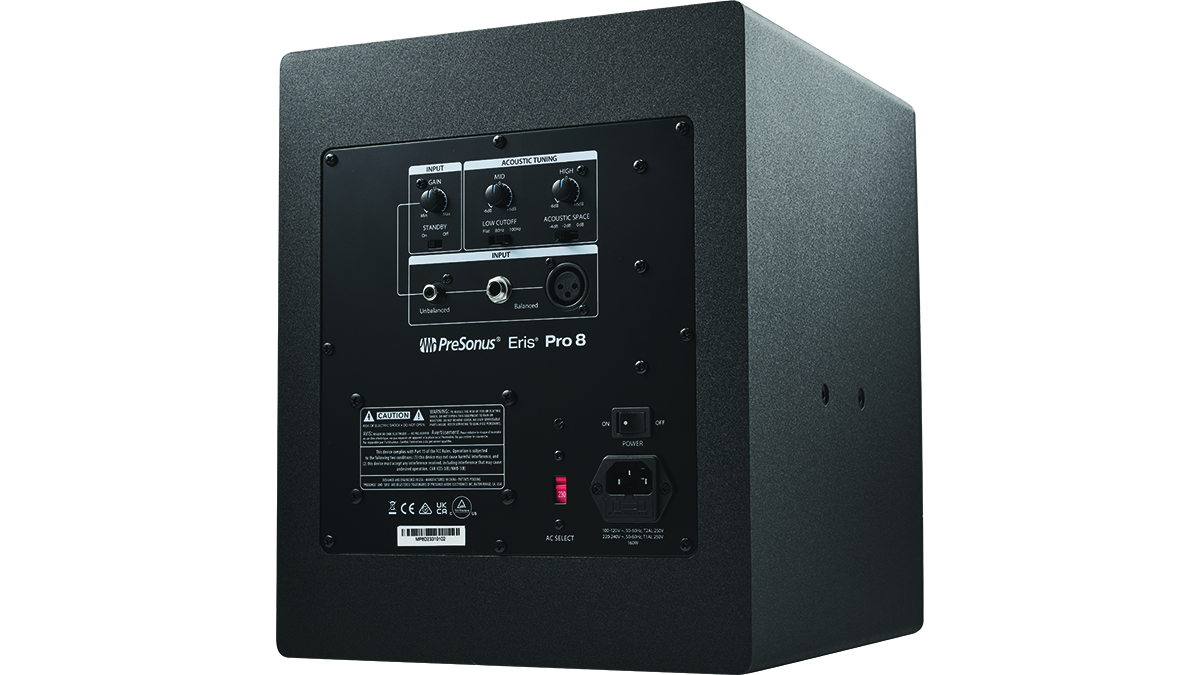
PreSonus Eris Pro 8: What is it?
The recently revamped PreSonus Eris monitor range includes upgrades to existing models and also some new additions.
The Pro 6 and Pro 8 are new 2-way coaxial nearfields aimed at professional users, and it’s the larger Pro 8 that we have for review. Coaxial monitors are not a new thing for PreSonus. Nevertheless, the Eris Pro 8 leaves behind the distinctive horn tweeter from their Sceptre series monitors, opting for a more low key and, we think, more attractive tweeter design.

PreSonus Eris Pro 8: Performance and verdict
Key components include an 8” woven glass fibre woofer, 1.25” silk dome tweeter and class AB amplification (65W HF and 75W LF). These are very similar specs to those for the Eris Studio 8; however, overall the Pro 8 is more compact, more expensive and specifically targets professional users. Key aspects, which you won’t find on the Studio 8, are the side-positioned mounting points. With a suitable heavy-duty bracket the Pro 8 can be ceiling or wall-mounted, making it ideal for multi-channel users. What’s missing, though understandably at this price, are digital inputs and digital room calibration.
The Eris Pro 8 is a front slot-ported design. The centre-mounted tweeter includes its own mini waveguide and the whole tweeter configuration sits slightly proud of the front baffle. Round the back you’ll find two balanced inputs (XLR and ¼” TRS) and one unbalanced input (phono), alongside amplifier gain, acoustic tuning controls and power switch. There’s also a dip switch to activate power saving mode, and when this is active the front panel blue power indicator changes to white.
The acoustic tuning controls are very similar to Eris Studio series monitors. The Acoustic Space setting (-2dB or -4dB) compensates for wall and corner proximity and operates from 800Hz down. This has a very obvious influence on the sound, and although we settled on using the -2dB option, we could probably have used the flat setting even with the monitors reasonably close (about a foot) from the back wall. Meanwhile, if you’re using the Pro 8 with a subwoofer there’s also a handy low-cut filter at 80Hz or 100Hz. Further tweaking comes from mid and high band EQ (+/- 6dB at 1kHz and 10kHz respectively).

Cohesive image
In listening tests, the Pro 8 delivers an accurate pinpoint sound, with the two drivers producing an impressively cohesive image across the frequency range, even up close. The sweet spot is also broad, both horizontally and vertically, which enhances the ease of use. We were able to A/B them with the Studio 8, and there are clearly similarities, no doubt down to the underlying components. That said, there are also very clear differences, and although to our ears the Studio 8 has a bit more low end, we think the Pro 8 offers a more evenly balanced sound with a more revealing mid range. Still, the big difference is the cohesiveness of the image, and this is where the Pro 8 truly shines.
At £429 each, the Eris Pro 8 might seem on the pricey side, but we think that’s simply because its sibling, the Studio 8, is so competitively priced. Ultimately, the Pro 8’s balance and imaging really drew us in, and if your budget allows, we think they’re definitely worth checking out.
MusicRadar verdict: A large nearfield with great balance and excellent cohesive imaging, and it should definitely be on your audition list.
PreSonus Eris Pro 8: The web says
"The Pro 8 really comes into its own in surround and immersive set-ups, where the pinpoint localisation accuracy of its coaxial driver provides a tangible advantage alongside an integrated mounting option."
MusicTech
PreSonus Eris Pro 8: Hands-on demos
PreSonus Audio Electronics
Gear4music Synths & Tech
PreSonus Eris Pro 8: Specifications
- KEY FEATURES: Design: Single point source coaxial, front ported Cabinet: Vinyl-laminated MDF Drivers: HF 1.25” silk dome tweeter, LF 8” woven glass fibre composite Amplification: Class AB, LF 75W, HF 65W Crossover Frequency: 3.1kHz Frequency Response: 35Hz - 20kHz Input Impedance: 10kΩ.
- CONTACT: PreSonus







